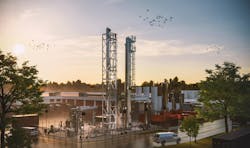New York Coca-Cola producer using On-site Power to recover CO2 for Beverage use
Liberty Coca-Cola Beverages has selected Clarke Energy USA to design and install a turn-key quad-generation system at its beverage production facility in Elmsford, New York.
Clarke Energy is a power generation solutions provider and a subsidiary of manufacturing firm Kohler, while Liberty is the largest family-owned authorized producer and distributor of Coca-Cola beverages in the northeast U.S.
According to Clarke Energy, the quad-generation system will generate electricity, heat and cooling at high efficiency, delivering significant carbon savings to the bottling plant compared to grid-sourced electricity. It will also recover carbon dioxide (CO2), further reducing the need to source it from the market. It can also be called a combined heat and power (CHP) or cogeneration system.
“This complex technology can substantially reduce manufacturer’s carbon emissions through high efficiency local energy production,” said Jamie Clarke, Chief Executive Officer of Clarke Energy. “With the benefits of the recent Inflation Reduction Act and increased price of CO2 globally, this provides many opportunities for carbon capture technologies in the United States.”
More on the C&I Energy Transition in the Beverage Industry
H2-fired Boiler planned to provide Carbon-free heat for Scottish Whiskey Distillery
Coca-Cola Canada adds six Class 8 Battery-Electric Trucks
Our Latest Newsletter: From Microbes to Microgrids--Many Paths to Net Zero
Clarke Energy notes that it evaluated Liberty’s manufacturing systems and processes to design an energy solution that would optimize the site’s environmental performance.
Two Jenbacher gas-powered reciprocating engines will be installed to recover CO2 directly from the engine exhaust systems, thus eliminating the need to purchase CO2 and import it on-site to aid in the carbonation process during the production of beverages.
Exhaust gas upgrading systems will be used to polish the final CO2 product to International Society of Beverage Technologists (ISBT) and Coca-Cola internal CO2 standards. The engines will also provide thermal energy and cooling for internal processes while delivering almost 1.7 MW of electrical power to the facility.
